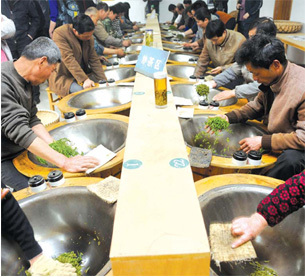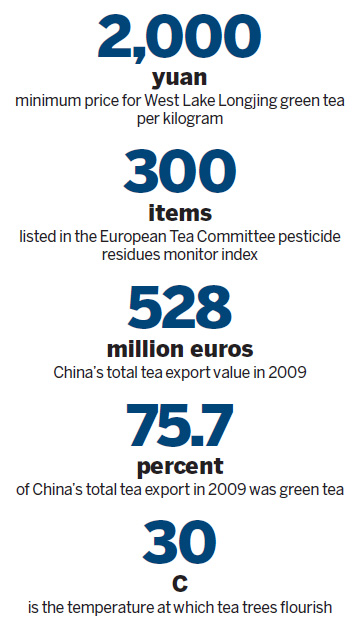Economy
Tea Time
Updated: 2011-01-21 12:49
(China Daily European Weekly)
Zhejiang province in East China is a major producer of green tea. In 2009, its total tea export was valued at $305 million and registered at 149,600 tons, accounting for 49.4 percent of the country's total.
Green tea occupies 89.6 percent in the breakdown, with 134,000 tons in total and a value of $277 million. The tea for export from China costs $2 per kg on average.
|
 Farmers at Yangmeiling villiage in Hangzhou attend a competition on tea processing.Provided to China Daily |
"It's more a matter of drinking habit and tea culture than anything else," Chen says.
"Here in China, people are willing to pay 1,000 yuan (114 euros) for only half a kilogram of green tea. I doubt any consumer in Europe could do so with ease. This also explains why second-rate tea in China is for exports.
A 60-year-old retired teacher surnamed Xin once bought 60 boxes of green tea, each weighing half a kilogram.
"My son just got married and I bought the green tea as gifts for those who attended the wedding reception to show our appreciation," Xin says.
Huang Ying, an Ecole Superieure de Commerce de Paris (ESCP) graduate, is now a senior manager at a French company in Beijing. Huang says she goes to Maliandao tea market in southwest Beijing twice a month.
|
 |
Huang favors one tea shop that is marked with the number 1851. The shop owner has a tea garden in his hometown in East China's Fujian province. 1851 actually stands for the height in meters of the mountain where his tea garden is situated.
"I like it that the shop owner offers me different kinds of tea," Huang says.
"I can sit there and take my time to decide which is my favorite. The shop owner always smiles and he will tell me how the tea is made, because even if the tea leaves come from the same tree, they would taste different if made by a different master."
The best tea in China is always handmade and never mass-produced like powder green tea, which few Chinese would care to drink.
"We drank powder green tea in the 1960s when we had barely anything," Xin says.
"And we drank it in bowls which cost only two fen (0.002 euros) each."
Wang Xufeng, professor with Zhejiang Agriculture and Forestry University, says: "Tea is a rarity good. It depends greatly on its birthplace, the soil, the water and weather conditions."
The West Lake Longjing green tea is considered the best of the best tea in China. In 2001, the State Quality Control Bureau issued a tea birthplace protection regulation, specifying that only tea produced from the tea trees in the West Lake district of Hangzhou, Zhejiang can be called "West Lake Longjing Green Tea". Those from the vicinity can only be called "Tiantang Longjing" or "Zhejiang Longjing".
The West Lake Longjing green tea is associated with many legends. One is about the Emperor Qianlong (1711-1799) of the Qing Dynasty (1644-1911) who favored 18 green tea trees in the Longjing village. Those tea trees are still alive, surpassing generations of kings and queens. In 1972, late Chinese Premier Zhou Enlai accompanied Richard Nixon, the first American president who visited China, to pay a tribute to those "Emperor tea trees".
The price of West Lake Longjing green tea varies from 2,000 yuan per kg upwards, according to seasonal changes. At its peak, it was sold at 20,000 yuan per kg.
Jiang Nan, a tea company owner in Hangzhou, says: "The tea leaves picked in early spring can easily meet the ETC standard, as pests have been killed by snow in winter. But it will be hard for those in summer and autumn, when pesticides are a must."
E-paper

Ear We Go
China and the world set to embrace the merciful, peaceful year of rabbit
Preview of the coming issue
Carrefour finds the going tough in China
Maid to Order
Specials

Mysteries written in blood
Historical records and Caucasian features of locals suggest link with Roman Empire.

Winning Charm
Coastal Yantai banks on little things that matter to grow

New rules to hit property market
The State Council launched a new round of measures to rein in property prices.
